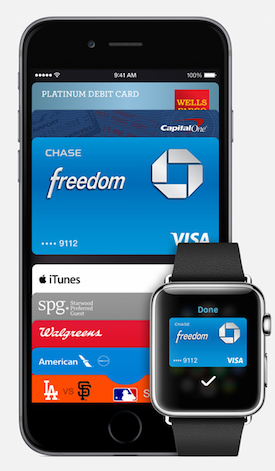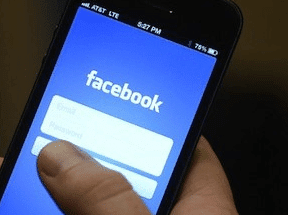Apple Pay is a new payment service announced by Apple on Sept. 9, with a launch date of Oct. 20. The service works with Apple iPhone 6 phones, using near field communication (NFC) technology. For users of iPhone 5, 5c, and 5s, the payment service will work if they buy an Apple Watch, which is scheduled for release in 2015.
Apple Pay works in physical stores. It allows shoppers to pay using their phones if the retailer has installed the NFC terminals. Shoppers need to store their credit card information in Apple Passbook by either syncing the cards from the iTunes service or by taking a picture of the credit card and storing it in Passbook.

Apple Pay uses NFC technology, for physical retailers. Image: Apple.
Apple Pay also works with mobile apps on iOS. Leading apps — such as Target, Uber, Panera Bread, and Groupon — have already signed up to support this service.
Currently Apple has no plans to support shopping on websites.
Apple Pay supports all leading credit cards. Apple has also worked with large big banks to make the service attractive and secure before the launch. Apple plans to launch this service with 220,000 retailers, so there will be plenty of places for shoppers to try out the service.
Apple Pay comes with several benefits.
Apple Pay: Pros
- Simpler payments. Once shoppers have their credit card stored in the iPhone, they need only hold the phone near an NFC reader, approve the transaction with their fingerprint using iPhone’s Touch ID, and the payment is processed within a couple of seconds. The process is simpler than the traditional credit card swiping process, which typically includes (a) swiping a card and then selecting debit or credit, (b) providing a separate identification, and (c) affixing a signature.
- Secure. Since a credit card does not need to be present, there’s less likelihood of a stolen number. Moreover, Apple does not use the credit card number for processing the payment but uses a token called the “device account number” to process the transaction, which further reduces the chances of the credit card details getting stolen. Apple Pay is an implementation of the EMVCo specification that is considered by many industry experts as the most secure payment mechanism.
- Greater privacy. Apple will not track shopper transactions and store the data. This offers more privacy. Also, the use of device account numbers versus the credit card makes the transaction even more private with the retailers as they do not see the shopper’s name and other details, such as the billing address.
- Lower risk. Large retailers like Target and Home Depot have recently experienced credit card breaches. Apple Pay eliminates that by avoiding the use of the card details as part of the transaction. With Apple Pay, the device account number, along with a transaction-specific dynamic security code, is used to process the payment. So the actual credit or debit card numbers are never shared by Apple with retailers or transmitted with the payment.
- Better experience. Apple is known for creating superlative user experiences. Apple Pay is no exception. Based on published reports and available videos, the service seems to be easy to use. The service automatically selects the default card from Passbook for payments, which can easily be overridden with a swipe.
- No extra fees for retailers. Apple is not charging retailers or shoppers fees for this new service. But it does take a portion of existing credit card transaction fees. That presumably is why Apple spent the last two years working with all the big credit card companies and banks to iron out all the nuances of this service.
Apple Pay: Cons
- Adoption. Getting shoppers and retailers to use the service could be difficult, since it requires shoppers to have an iPhone 6 and retailers to support NFC terminals.
- No online shopping support. You can use Apple Pay to buy apps and buy other items within apps but the service does not support online shopping. Since a large percentage of iPhone 6 users would also likely shop online, the service has a huge limitation, unless Apple is trying to emphasize mobile shopping — or unless it adds online shopping in the near future.
- Stability. Apple Pay looks good now; but can it scale when millions of shoppers start using it? Can an Apply Pay transaction process as quickly in practice as it has in the demos? If not, it will impact adoption. Shoppers would not likely wait while the iPhone is attempting to confirm the transaction.
- Higher fees. Currently the service is being launched with no extra fees. But will this continue? Some observers wonder if credit card companies will stop sharing the fees with Apple, which could result in higher fees for retailers, which could hurt adoption.




